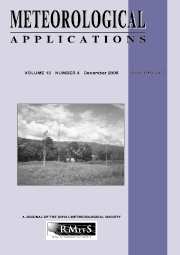Article contents
Improvements to snow and ice control on European highways
Published online by Cambridge University Press: 23 January 2002
Abstract
The need for innovative snow and ice control techniques and processes has continued to grow as national and European road networks have developed substantially over recent decades. The demand for improvement, including the sophistication of the techniques and technology used, continues to be driven by the increasing need for safe and efficient national and international road freight and passenger transport and by the environmental and other policies affecting highways (roads and bridges).
The European Commission project ‘COST Action 344: Improvements to snow and ice control on European roads and bridges’ started in April 1999 as a three-year project, with participation from 18 European countries - Austria, Belgium, Czech Republic, Denmark, Finland, France, Germany, Hungary, Iceland, Ireland, Norway, Poland, Romania, Slovenia, Spain, Sweden, Switzerland and United Kingdom.
The project's aims are to:
1) review existing international practices,
2) define snow and ice control requirements in different European climatic regions,
3) specify ‘Best Practice’ in different European climatic regions,
4) develop guidelines for the integration of specified snow and ice control methods into network level road management and maintenance systems,
5) recommend improvements to driver information and traffic management systems, and
6) recommend future research projects.
This COST Action will promote the exploitation of technological advances in the application and distribution of snow and ice control measures, with a view to providing significant environmental and safety benefits and lower operational costs. Millions of ECUs could be saved through lower operational costs and a reduction in adverse effects on the highway infrastructure and the environment. For road users, more effective management of winter operations could lead to a reduction in traffic delays and accidents. For practitioners, implementation of ‘Best Practice’ should enhance standards and lead to ‘best value’ being achieved. The implementation of best value could provide the means to measure the performance of the winter maintenance service within various road administrations. For widespread dissemination of knowledge, interim results of the COST Action are being made available to European and national policy-makers, regional planners, engineers, road and vehicle operators, industry and academia. The internet, a CD-ROM, email, handbooks and events such as workshops, conferences and seminars are also being used to target a wider audience of practitioners and researchers.
- Type
- Research Article
- Information
- Copyright
- © 2001 Royal Meteorological Society
- 4
- Cited by


